List of governors of Oregon
From Wikipedia, the free encyclopedia
The governor of Oregon is the head of government of the U.S. state of Oregon.
List of governors
Summarize
Perspective
The Oregon Country was obtained by the United States on January 30, 1819,[1] as a shared region with the United Kingdom. The Oregon Treaty ended the sharing and formally established the borders on June 15, 1846.[2]
The Champoeg Meetings, including a constitutional committee, held from February 1841 until May 1843, served as a de facto government before the government was officially established. While early attempts at establishing a government had been unsuccessful because of discontent between English American and French Canadian settlers over the question of whom they should choose as governor, several other officers were elected at these meetings, including Ira Babcock as Supreme Judge. For lack of a government, the Supreme Judge also received executive and legislative duties.[3][4]
The meetings at Champoeg led up to the first constitution of the Oregon Country and several petitions for U.S. territorial status. The resulting acts created a provisional government on July 5, 1843. The first leaders of this government were an elected three-person Executive Committee. Later, George Abernethy was elected governor, and served from June 3, 1845, to March 3, 1849, though this government was never recognized by the federal government.
Oregon Territory
The region was organized as Oregon Territory on August 14, 1848.[5] During its history it had five governors appointed by the president of the United States.
| No. | Governor | Term in office[a] | Appointing President | |
|---|---|---|---|---|
| 1 |  |
Joseph Lane (1801–1881) [6] |
August 18, 1848[b] – June 18, 1850 (successor appointed)[c] |
James K. Polk |
| 2 |  |
John P. Gaines (1795–1857) [11] |
October 2, 1849[d] – May 16, 1853 (successor appointed) |
Millard Fillmore |
| 3 |  |
Joseph Lane (1801–1881) [6] |
May 16, 1853[e] – May 18, 1853 (resigned)[f] |
Franklin Pierce |
| 4 | 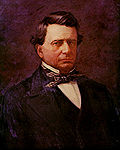 |
John Wesley Davis (1799–1859) [22] |
September 6, 1853[g] – August 1, 1854 (resigned)[h] |
Franklin Pierce |
| 5 |  |
George Law Curry (1820–1878) [21] |
November 1, 1854[i] – July 8, 1858 (statehood) |
Franklin Pierce |
State of Oregon
The state of Oregon was admitted to the Union on February 14, 1859.[26]
The 1857 Constitution of Oregon provided for the election of a governor every four years, to serve no more than eight out of any twelve years.[27] This length and limit have never been changed. It is one of the few states without a lieutenant governor. The office would devolve upon the secretary of state upon vacancy[28] until a 1920 amendment put the president of the Senate first in the line of succession,[29] and a 1972 amendment returned the secretary of state to the front.[30]
| No. | Governor | Term in office | Party | Election | ||
|---|---|---|---|---|---|---|
| 1 |  |
John Whiteaker (1820–1902) [31][32] |
July 8, 1858[j] – September 10, 1862 (did not run) |
Democratic[33] | 1858 | |
| 2 |  |
A. C. Gibbs (1825–1886) [34][35] |
September 10, 1862[36] – September 12, 1866 (did not run) |
Republican[33] | 1862 | |
| 3 |  |
George Lemuel Woods (1832–1890) [37][38] |
September 12, 1866[39] – September 14, 1870 (did not run) |
Republican[33] | 1866 | |
| 4 |  |
La Fayette Grover (1823–1911) [40][41] |
September 14, 1870[42] – February 1, 1877 (resigned)[k] |
Democratic[33] | 1870 | |
| 1874 | ||||||
| 5 |  |
Stephen F. Chadwick (1825–1895) [43][44] |
February 1, 1877[45] – September 11, 1878 (did not run)[43] |
Democratic[33] | Succeeded from secretary of state | |
| 6 | 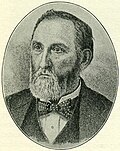 |
W. W. Thayer (1827–1899) [46][47] |
September 11, 1878[48] – September 13, 1882 (did not run)[46] |
Democratic[33] | 1878 | |
| 7 |  |
Zenas Ferry Moody (1832–1917) [49][50] |
September 13, 1882[51] – January 12, 1887 (did not run)[49] |
Republican[33] | 1882 | |
| 8 |  |
Sylvester Pennoyer (1831–1902) [52][53] |
January 12, 1887[54] – January 16, 1895 (term-limited)[l] |
Democratic[m] | 1886 | |
| 1890 | ||||||
| 9 |  |
William Paine Lord (1838–1911) [56][57] |
January 16, 1895[58] – January 10, 1899 (lost nomination)[56] |
Republican[33] | 1894 | |
| 10 |  |
Theodore Thurston Geer (1851–1924) [59][60] |
January 10, 1899[61] – January 14, 1903 (did not run) |
Republican[33] | 1898 | |
| 11 |  |
George Earle Chamberlain (1854–1928) [62][63] |
January 14, 1903[64] – March 1, 1909 (resigned)[n] |
Democratic[33] | 1902 | |
| 1906 | ||||||
| 12 |  |
Frank W. Benson (1858–1911) [65][66] |
March 1, 1909[67] – June 16, 1910 (resigned)[o] |
Republican[33] | Succeeded from secretary of state | |
| 13 |  |
Jay Bowerman (1876–1957) [68][69] |
June 16, 1910[70] – January 10, 1911 (lost election) |
Republican[33] | Succeeded from president of the Senate | |
| 14 |  |
Oswald West (1873–1960) [71][72] |
January 10, 1911[73] – January 12, 1915 (did not run)[71] |
Democratic[33] | 1910 | |
| 15 |  |
James Withycombe (1854–1919) [74][75] |
January 12, 1915[76] – March 3, 1919 (died in office) |
Republican[33] | 1914 | |
| 1918 | ||||||
| 16 |  |
Ben W. Olcott (1872–1952) [77][78] |
March 3, 1919[79] – January 8, 1923 (lost election) |
Republican[33] | Succeeded from secretary of state | |
| 17 |  |
Walter M. Pierce (1861–1954) [80][81] |
January 8, 1923[82] – January 10, 1927 (lost election) |
Democratic[33] | 1922 | |
| 18 |  |
I. L. Patterson (1859–1929) [83][84] |
January 10, 1927[85] – December 21, 1929 (died in office) |
Republican[33] | 1926 | |
| 19 |  |
Albin Walter Norblad Sr. (1881–1960) [86][87] |
December 21, 1929[88] – January 12, 1931 (lost nomination)[p] |
Republican[33] | Succeeded from President of the Senate | |
| 20 | 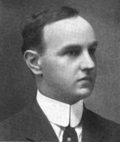 |
Julius Meier (1874–1937) [89][90] |
January 12, 1931[91] – January 14, 1935 (did not run)[89] |
Independent[33] | 1930 | |
| 21 |  |
Charles Martin (1863–1946) [92][93] |
January 14, 1935[94] – January 9, 1939 (lost nomination)[q] |
Democratic[33] | 1934 | |
| 22 |  |
Charles A. Sprague (1887–1969) [95][96] |
January 9, 1939[97] – January 13, 1943 (lost nomination)[95] |
Republican[33] | 1938 | |
| 23 | 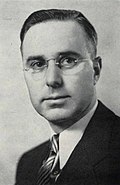 |
Earl Snell (1895–1947) [98][99] |
January 13, 1943[100] – October 28, 1947 (died in office) |
Republican[33] | 1942 | |
| 1946 | ||||||
| 24 |  |
John Hubert Hall (1899–1970) [101][102] |
October 28, 1947[r] – January 10, 1949 (lost nomination)[101] |
Republican[33] | Succeeded from speaker of the House[s] | |
| 25 |  |
Douglas McKay (1893–1959) [104][105] |
January 10, 1949[106] – December 17, 1952 (resigned)[t] |
Republican[33] | 1948 (special) | |
| 1950 | ||||||
| 26 |  |
Paul L. Patterson (1900–1956) [107][108] |
December 17, 1952[109] – January 31, 1956 (died in office) |
Republican[33] | Succeeded from president of the Senate | |
| 1954 | ||||||
| 27 |  |
Elmo Smith (1909–1968) [110][111] |
January 31, 1956[u] – January 14, 1957 (lost election) |
Republican[33] | Succeeded from president of the Senate | |
| 28 |  |
Robert D. Holmes (1909–1976) [113][114] |
January 14, 1957[115] – January 12, 1959 (lost election) |
Democratic[33] | 1956 (special) | |
| 29 |  |
Mark Hatfield (1922–2011) [116][117] |
January 12, 1959[118] – January 9, 1967 (term-limited)[l] |
Republican[33] | 1958 | |
| 1962 | ||||||
| 30 | 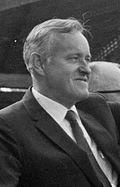 |
Tom McCall (1913–1983) [119][120] |
January 9, 1967[121] – January 13, 1975 (term-limited)[l] |
Republican[33] | 1966 | |
| 1970 | ||||||
| 31 |  |
Robert W. Straub (1920–2002) [122][123] |
January 13, 1975[124] – January 8, 1979 (lost election) |
Democratic[33] | 1974 | |
| 32 |  |
Victor Atiyeh (1923–2014) [125] |
January 8, 1979[126] – January 12, 1987 (term-limited)[l] |
Republican[125] | 1978 | |
| 1982 | ||||||
| 33 | 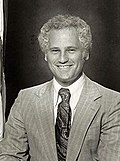 |
Neil Goldschmidt (1940–2024) [127] |
January 12, 1987[128] – January 14, 1991 (did not run) |
Democratic[127] | 1986 | |
| 34 |  |
Barbara Roberts (b. 1936) [129] |
January 14, 1991[130] – January 9, 1995 (did not run) |
Democratic[129] | 1990 | |
| 35 |  |
John Kitzhaber (b. 1947) [131] |
January 9, 1995[132] – January 13, 2003 (term-limited)[l] |
Democratic[131] | 1994 | |
| 1998 | ||||||
| 36 |  |
Ted Kulongoski (b. 1940) [133] |
January 13, 2003[134] – January 10, 2011 (term-limited)[l] |
Democratic[133] | 2002 | |
| 2006 | ||||||
| 37 |  |
John Kitzhaber (b. 1947) [131] |
January 10, 2011[135] – February 18, 2015 (resigned)[v] |
Democratic[131] | 2010 | |
| 2014 | ||||||
| 38 |  |
Kate Brown (b. 1960) [137] |
February 18, 2015[138] – January 9, 2023 (term-limited)[l] |
Democratic[137] | Succeeded from secretary of state | |
| 2016 (special) | ||||||
| 2018 | ||||||
| 39 |  |
Tina Kotek (b. 1966) [139] |
January 9, 2023[140] – Incumbent[w] |
Democratic[139] | 2022 | |
See also
Notes
- James Shields was nominated and confirmed by the Senate on August 14, 1848;[7] however, he declined the post.[8] Lane was then appointed on August 18, 1848, during a Senate recess;[6] nominated on December 12;[8] and confirmed by the Senate on December 20.[9] He took the oath of office in the territory on March 3, 1849.[6]
- Lane's successor Gaines was confirmed by the Senate on October 2, 1849. However, it took him nine months to reach the territory; Lane had received no official notice of his replacement, and continued serving as governor until he resigned on June 18, 1850.[10] Territorial Secretary Kintzing Prichette acted as governor until Gaines arrived.[6]
- Joseph G. Marshall was appointed on August 9, 1849, during a Senate recess,[12][13] but declined the post.[12][14] Some sources say that Abraham Lincoln was then appointed but declined,[15][11] but the Territorial Papers have no record of a formal appointment.[12] Gaines was appointed on October 2, 1849, during a Senate recess;[12] nominated on December 21, 1849;[16] and confirmed by the Senate on September 9, 1850.[17] He arrived in the territory in August 1850.[11]
- Lane resigned three days after taking office, his goal of replacing the current unpopular governor complete, to return to his seat in the United States House of Representatives.[20][6] Territorial Secretary George Law Curry acted as governor until his successor arrived.[21]
- McMullin says Davis resigned, but no further details are given.[22] Territorial Secretary George Law Curry acted as governor until he was appointed successor.[21]
- Curry was appointed on November 1, 1854, during a Senate recess;[21] nominated on July 7, 1856,[24] but was not confirmed before the Senate session expired; and nominated and confirmed by the Senate on August 22, 1856.[25] The territorial papers also note an appointment or confirmation on March 5, 1855, but no other information has been found on this date.[12]
- Whiteaker was sworn in on July 8, 1858, eight months before Oregon formally became a state.[31]
- Grover resigned, having been elected to the United States Senate.[40]
- Governors are ineligible to serve more than eight years in any period of twelve years.[55]
- Pennoyer was nominated by the Democratic party in 1886, by the Democrats and Union Party in 1890, and he joined the Populist Party in 1892.[52]
- Chamberlain resigned, having been elected to the United States Senate.[62]
- Benson resigned due to ill health.[65]
- Norblad lost the Republican nomination to George W. Joseph; however, Joseph died a month later, and Norblad, who had come in second to Joseph, refused to be considered.[86]
- Martin lost the Democratic nomination to Henry L. Hess.[92]
- Hall technically became governor upon the death of Governor Snell on October 28, though he took a formal oath of office on October 30 after Snell's body was identified.[103]
- Governor Snell, President of the Senate Marshall Cornett, and Secretary of State Robert S. Farrell Jr. died in a plane crash on October 28, 1947; the next in the line of succession was Speaker of the House Hall.[98]
- McKay resigned, in anticipation of being nominated for United States Secretary of the Interior.[104]
- Patterson died late on January 31, and Smith took the oath of office the morning of February 1.[112]
- Kitzhaber resigned due to an ethics scandal.[136]
- Kotek's term will expire on January 11, 2027.
References
External links
Wikiwand - on
Seamless Wikipedia browsing. On steroids.